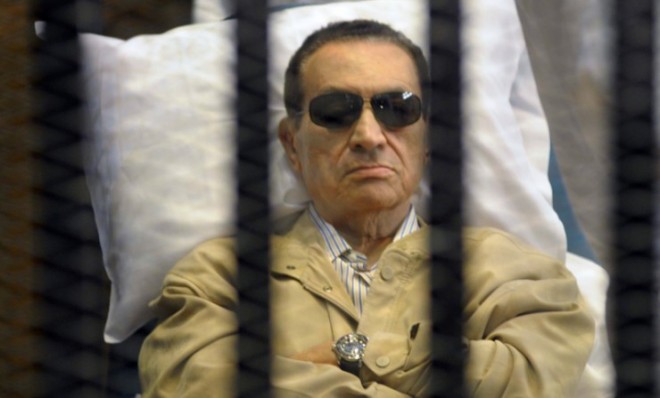Dispatch from Cairo: Will Egypt let Hosni Mubarak off the hook?
The ousted despot gets a retrial — disappointing people across all walks of Egyptian life

A free daily email with the biggest news stories of the day – and the best features from TheWeek.com
You are now subscribed
Your newsletter sign-up was successful
CAIRO, EGYPT — This week, a high court in Cairo ordered a retrial of ousted dictator Hosni Mubarak, who was sentenced to life in prison last summer in connection with the brutal crackdown against the 2011 revolution that left more than 800 civilians dead.
While this new trial has the potential to bring new charges against high-ranking members of the old regime who have so far escaped punishment, it could also significantly reduce Mubarak's sentence, and underscores the fact that major institutions in Egypt are still controlled by relics of the old regime.
The court did not give any specific legal reason for the retrial, but like most notable events since the Arab Spring revolution here, Mubarak's original trial was both flawed and controversial, leaving both Mubarak's powerful supporters and his numerous detractors disappointed.
The Week
Escape your echo chamber. Get the facts behind the news, plus analysis from multiple perspectives.

Sign up for The Week's Free Newsletters
From our morning news briefing to a weekly Good News Newsletter, get the best of The Week delivered directly to your inbox.
From our morning news briefing to a weekly Good News Newsletter, get the best of The Week delivered directly to your inbox.
The prosecution had initially accused Mubarak and and his former interior minister of directly ordering the use of live ammunition on protesters, and thus sought the death penalty. These allegations are widely believed by the Egyptian public, and given Mubarak's tight fisted control of the security forces, are more than plausible.
In the end, though, Mubarak was only convicted of negligently not stopping the murders, not directly ordering them. And Mubarak's politically influential sons and six high-ranking police officers were found innocent of wrongdoing, further enraging the victims' families and Egyptians generally.
While the retrial could potentially see Mubarak found guilty of ordering the crackdown, under Egyptian law he could not receive a stiffer sentence, regardless of any new convictions. But the retrial could potentially lighten his sentence or even clear him of charges. This has led many to believe that this retrial is simply a ploy on the part of high-ranking judges to spare Mubarak from significant punishment. Since most high-ranking judges and members of the security forces in power today were part of Mubarak's regime, there is reason to be suspicious of their intention to prosecute criminal elements from the Mubarak era or to support any of the vital reforms the revolution demanded.
While the judges bowed to popular pressure to punish Mubarak over the summer, there are rumors that they never intended to follow through with the sentence and were waiting for the right time to rescind it. Now would certainly appear to be the right time.
A free daily email with the biggest news stories of the day – and the best features from TheWeek.com
After decades of one-party rule, even a superhumanly unifying figure would have a tough time truly reforming the system here. For a democratically elected government to clear the judiciary, press, and security forces of Mubarak loyalists, it would not only have to challenge entrenched elites, but also temporarily do away with the separation of judicial, executive, and legislative power that is vital to modern democracy.
The revolutionary movement, which during its heyday saw Islamists, socialists ,and liberals put aside their differences for the greater good of Egypt, is now irreconcilably splintered. And the various new political factions are increasingly making deals with members of the old regime, including criminal elements, in the name of political expediency.
The tenaciousness of the old elite combined with incompetence on the part of the revolutionary parties and increasing disillusionment and disappointment on the part of everyday Egyptians makes the prospects of true reform very slim here.
More and more Egyptians I talk to express the opinion that the protest movement against Mubarak was not a Thawra (completed revolution) but rather an Intifada (a possibly noble, but not necessarily successful uprising).
Given Mubarak's bad health and his massive unpopularity, it is unlikely that he will ever live to see freedom. However, despite all the drama and initial optimism the Arab Spring engendered here, it seems that the powerful will keep their ill-got privilege, the innumerable destitute Egyptians will remain poor, and the guilty will go unpunished.
Jake Lippincott earned a degree in Middle Eastern Studies at Hampshire College. He worked in Tunis during the popular uprising there, and is now based in Cairo.
Jake Lippincott earned a degree in Middle Eastern Studies at Hampshire College. He worked in Tunis during the popular uprising there, and is now based in Cairo.
-
 How the FCC’s ‘equal time’ rule works
How the FCC’s ‘equal time’ rule worksIn the Spotlight The law is at the heart of the Colbert-CBS conflict
-
 What is the endgame in the DHS shutdown?
What is the endgame in the DHS shutdown?Today’s Big Question Democrats want to rein in ICE’s immigration crackdown
-
 ‘Poor time management isn’t just an inconvenience’
‘Poor time management isn’t just an inconvenience’Instant Opinion Opinion, comment and editorials of the day